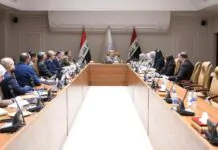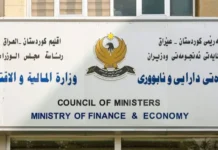The Central Bank Defends The Dinar Amid Declining Foreign Reserves
November 12, 2025 Baghdad – Nada Shawkat The Central Bank of Iraq affirmed its continued policy of defending the dinar’s exchange rate against the dollar. In a statement yesterday, the bank said, “The information circulating on some websites and social media regarding a reduction in the exchange rate to 4,000 dinars is baseless,” emphasizing that “current monetary indicators support maintaining the current exchange rate.”
The statement reiterated the bank’s commitment to financial and monetary stability in the country. Meanwhile, economic data revealed a decline in Iraq’s foreign reserves for three consecutive years, an indicator that warrants careful consideration.
According to economic reports, (reserves reached $111.7 billion in 2023, then decreased to $100.2 billion in 2024, and continued to decline to reach $98.1 billion by September 2020). The reports added that (Iraq lost more than $13 billion of its reserves in just two years, or about 12 percent of its previous balance).
They pointed out that (this decline, although it appears gradual, carries worrying economic implications, most notably increased pressure on the local currency, as foreign reserves constitute the first line of defense for the dinar’s exchange rate).
The reports explained (the erosion of the financial surplus resulting from high oil prices, which suggests excessive government spending or weak revenue management, in addition to the continuation of a rentier economy dependent on oil, where the size of the reserves is directly linked to fluctuations in oil prices and not to non-oil production or exports). They emphasized that (Iraq is consuming more of its savings than it is adding to them, a path that cannot continue without genuine financial reform).
Meanwhile, economist Basim Jamil Antoine believes that approving this year’s budget after the elections seems unlikely due to disagreements and violations of the law. In a statement yesterday, Antoine explained that “a budget is a fundamental principle in any country and requires accurate final accounts.
Disagreements have prevented the approval of this year’s budget and the preparation of next year’s budget.” He emphasized that “political conflicts have also affected the process,” noting that “the budget is a routine matter that can be completed within a month, but the conflict between the blocs has delayed it.”
For his part, economist Salah Nouri pointed out that the Financial Management Law served as a vital safeguard, saving Iraq from a potential financial deficit by regulating mechanisms for dealing with delays or failures in approving the federal budget within the specified deadlines.
Nouri stated yesterday that the Financial Management Law addresses cases related to the approval of the general budget. He pointed out that Article 13 stipulates clear procedures to ensure the continuity of spending, even if the budget is delayed beyond December 31st of the year preceding its preparation.
Nouri explained that the same article authorizes the Minister of Finance to issue official circulars based on specific criteria, allowing for expenditures of one-twelfth of the total actual current expenditures for the previous fiscal year, after excluding non-recurring expenses, to guarantee the uninterrupted payment of employee salaries and the operation of government facilities.
He further explained that the article also permits expenditures from the total annual allocation for ongoing investment projects whose allocations are included in the previous and subsequent fiscal years, according to the actual completion rates or completed stages of preparation, with the aim of preventing the suspension of projects under implementation.
He emphasized that the third paragraph of the article precisely addresses the situation of the budget not being finalized, stipulating that the final financial statements of the previous year be adopted as the basis for the financial statements of the new year, provided that these statements are presented to the Council of Representatives for approval.
This ensures the continuity of the state’s financial activity in a legal and organized manner. He added that this article, with its various paragraphs, The three represent a comprehensive solution to the delay or failure to approve the budget by the end of the fiscal year, and thus Iraq avoided falling into financial paralysis, especially after the House of Representatives approved a three-year budget, which contributed to strengthening financial stability and regulating government spending within clear and specific ceilings. LINK
For current and reliable Iraqi news please visit: https://www.bondladyscorner.com





